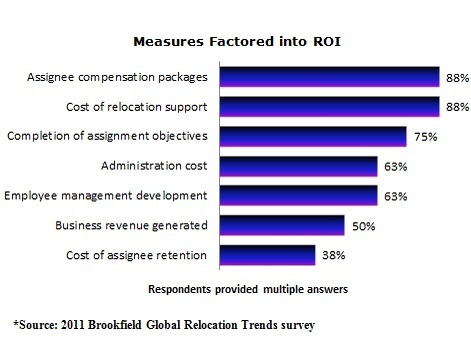In times of rapid business globalization, numerous opportunities exist for companies to operate in international markets. Going global to capture these opportunities requires multiple investments and assigning staff abroad is one of them.
However, this investment is substantial as an expatriate assignment costs three to five times more than a domestic employment at the same level. Given these high costs of assignments, we would assume that their corresponding value is a given. Companies argue that expatriates provide benefits both in the short and long term; yet, only a few can quantify these benefits. According to the 2011 Brookfield Global Relocation Trends survey, only 8% of responding firms actually appear to measure the return on investment (ROI) for global staff mobility.
ROI aims to quantify the demonstrated financial return on an assignment and thus includes both a cost and benefit analysis. For the respondents who measured ROI, the most frequently used cost items were assignee compensation packages and cost of relocation support. As for the benefits, the completion of assignment objectives and the management development of the employee were used the most.
Although several measures were identified, managers are still finding it difficult to track costs and calculate returns as they lack proper metrics. The majority of the companies do not measure ROI and the principal reasons for not doing so included ‘not sure how to achieve this’ (50%) and ‘not important in our organization’ (16%), as stated by respondents to the Brookfield survey.
Assignment success or failure can be identified quite easily based on the extent to which stated objectives were achieved, as assessed by the host and/or home country or even through expatriate self-assessments. Quantifying the financial return on investment however remains challenging. Thus, it seems that, at present, international assignments are accepted as the price of doing international business.



It’s good ROI is going into this aspect of researched business analysis. This business analysis has become very necessary considering the nature of global business. Many companies actually rely heavily on expatriate and they fail to calculate the cost of doing this. This is where ROI is needed. Companies don’t have the time due to tight time frame to carry out this important business analysis. Expatriate’s are very expensive to maintain compared to indigenous workers. Well done to the RIO companies. Check out my site:
http://www.bancdebinarydemo.com/
This is a nice info. A proper business analysis is a must in today’s world to stay ahead of the competiton.